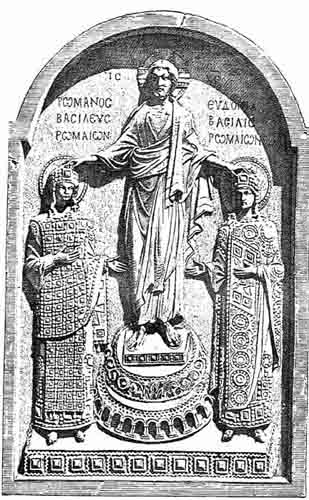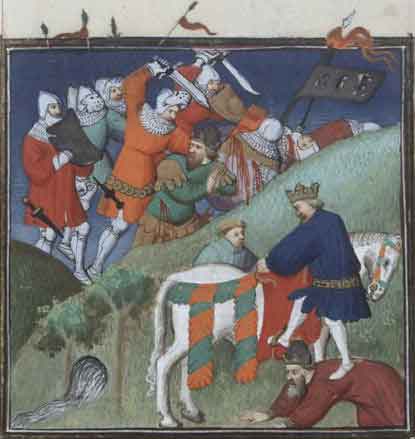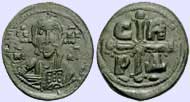|
|
Romanos IV Diogenes or Romanus IV Diogenes (Greek: Ρωμανός Δ΄ Διογένης, Rōmanos IV Diogenēs), Byzantine emperor from 1068 to 1071. Reign Romanos Diogenes was the son of Constantine Diogenes and a member of a distinguished Cappadocian family. He had risen to distinction in the army, until he was convicted of conspiracy to seize the throne from the sons of Constantine X Doukas in 1067. While waiting for his execution he was summoned into the presence of the empress regent, Eudokia Makrembolitissa, whom he so fascinated that she granted him a free pardon and married him on January 1, 1068. With this Romanos IV Diogenes became the senior emperor alongside Michael VII, Konstantios Doukas, and Andronikos Doukas. After his coronation he carried on three successful campaigns against the Seljuk Turks, whom he drove beyond the Euphrates in 1068–1069. In 1071 Romanos IV prepared a large-scale expedition against the Seljuk stronghold of Manzikert. Although his forces were numerous, they were not equally well-trained and contained various mercenary units. After initial successes in his campaign, Romanos IV fought in the Battle of Manzikert on August 26, 1071. He became isolated from the bulk of his army, which turned to flight, believing that the emperor had been killed. The disorderly withdrawal of the Byzantine army allowed the Seljuk Sultan Alp Arslan to capture Romanos IV and inflict a disastrous defeat on his forces. Romanos IV was treated with respect by his captor, who released him in exchange for a treaty and the promise of a hefty ransom. Gibbon in "Decline and Fall of the Roman Empire" recorded that Alp Arslan and Romanos IV Diogenes had a most interesting conversation. According to Gibbon, when the Sultan asked the Emperor what he should do with him, the Emperor replied "if you are cruel, you will take my life; if you listen to pride, you will drag me at your chariot wheels; if you consult your interest, you will accept a ransom and restore me to my country." When the Sultan asked the Emperor what treatment he could have expected had he been the one vanguished, the Emperor's fierce nature made him reply ""Had I vanguished, I would have inflicted on thy body many a stripe." Gibbon records the Sultan then lecturing the Emperor on Christian forgiveness, and then nobly declared he would not follow an example, the Emperor's, which he abhored. He then forgave the Emperor, gave him generous terms, loaded him with presents, and set him free. In the meantime the opposition against Romanos IV decided to exploit the situation. The Caesar John Doukas and Michael Psellos relegated Eudokia to a monastery and easily prevailed upon Michael VII to declare Romanos IV deposed. Before Romanos could gather support, he was attacked and defeated by Constantine and Andronikos Doukas, the sons of the Caesar John Doukas. Besieged by Andronikos Doukas in a fortress in Cilicia, Romanos surrendered after a promising to resign his claims to the throne and enter a monastery. While being brought back to Constantinople, Romanos was nevertheless blinded (June 29, 1072) and was sent into exile to the island of Prote. His blinding was carried out so brutally that he soon died because of the injury and subsequent infection. It was during his reign that the forces of Robert Guiscard captured Bari in 1071, and the Byzantine Empire lost its last holdings in Italy. Unable to stem this process, Romanos IV had turned his attention to affairs in the east.
Romanus IV and Alp Arslan. AlBNF Richelieu French Manuscript 226 Bocaccio, De casibus (translation Laurent de Premierfait), France, Paris, XV century
Romanus IV [Source] Family By his first wife, a daughter of Alusian of Bulgaria, Romanos IV Diogenes had at least one son: Constantine Diogenes, who died before 1068 By his second wife, the Empress Eudokia Makrembolitissa, he had: Nikephoros Diogenes Leo Diogenes Bibliography
Byzantine Emperor This article incorporates text from the 1911 Encyclopædia Britannica, which is in the public domain.
Retrieved from "http://en.wikipedia.org"
 |
|
|||||||||||||||||


